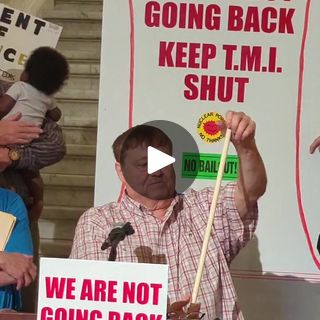Palisades nuclear relaunch gets more subsidies in Michigan — and more backlash

Michigan Gov. Gretchen Whitmer joined former governor and current Energy Secretary Jennifer Granholm in March to announce a $1.5 billion federal loan to restart the shuttered Palisades nuclear power plant. It was one of several rounds of public subsidies for the restart effort. (Bridge photo by Kelly House)
The Palisades Nuclear power plant restart effort has secured another round of public subsidies, with two rural electric cooperatives set to receive hundreds of millions of dollars to buy power from the facility.
The U.S. Department of Agriculture announced Thursday that Michigan-based Wolverine Power Cooperative and Indiana-based Hoosier Energy will each receive awards from the Empowering Rural America program, a $9.7 billion Inflation Reduction Act fund designed to help rural electric cooperatives transition to clean energy.
Spokespeople with the USDA Rural Development office refused to provide dollar amounts for the grants, but a Wolverine spokesperson said the company will receive more than $600 million.
Hoosier Energy officials did not immediately respond to an inquiry from Bridge Michigan about their grant.
That brings total public subsidies for the Palisades restart to more than $2.4 billion, including a $1.52 billion federal loan announced in March, and a $300 million commitment from the state of Michigan.
By offsetting the high prices that make nuclear energy an unappealing option for electric utilities, the latest subsidies clear a key barrier to restarting Palisades, which sits on the Lake Michigan shoreline in Van Buren County.
Related:
The plant closed in 2022 amid struggles to compete against cheaper energy sources. When Palisades was still operating, its power sometimes cost 57% more than competing sources.
Mothballing the facility eliminated hundreds of jobs and removed 800 megawatts from the grid overnight — enough to power 800,000 homes. That loss of reliable, emissions-free energy prompted bipartisan alarm among Michigan lawmakers, who mounted a public campaign to restart the plant.
Its owners, Holtec Energy, have since submitted restart applications to federal nuclear regulators, who say they plan to make a decision by mid-2025. Holtec officials hope to repower the plant by late 2025.
In a statement, Gov. Gretchen Whitmer called the latest cash infusion “another critical step” toward that goal.
“We are showing the world that Michigan will continue to lead the future of clean energy,” Whitmer said.
But pushback from anti-nuclear activists is intensifying. They have filed several petitions in recent weeks raising concerns about the restart plan with the federal Nuclear Regulatory Commission.
Nobody has ever attempted to reopen a shuttered nuclear plant, and opponents argue it’s unwise to do so.
They point to a history of safety violations, the danger of storing nuclear waste along the Lake Michigan shoreline, and concerns about aging infrastructure in the 53-year-old plant.
A decade ago, Palisades made a federal list of plants with the most “high level” safety violations nationwide, though government officials today routinely praise the plant’s more recent safety record.
“This plant was dangerous for decades before it shut down,” said Kevin Kamps, a radioactive-waste specialist with the nonprofit Beyond Nuclear. “It's even become more dangerous since, because of that lack of active safety maintenance.”
While the regulatory process plays out, Holtec Energy may be in line for yet more money for Palisades.
The company is seeking a $7.4 billion federal loan to build small nuclear reactors at Palisades and possibly other properties. And in March, Energy Secretary Jennifer Granholm told Bridge Michigan that the facility may qualify for additional tax incentives.

























